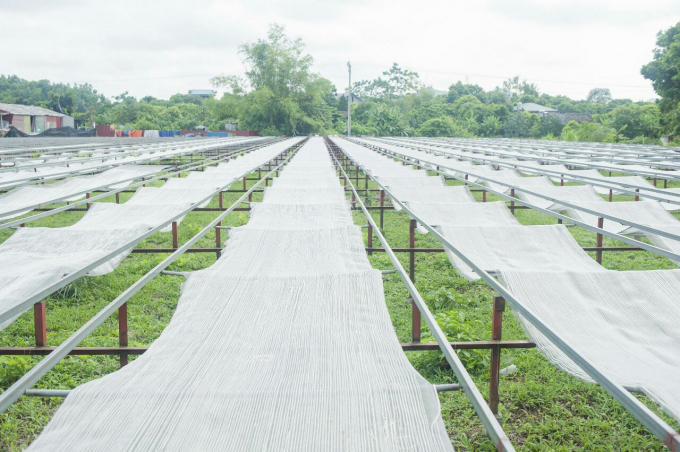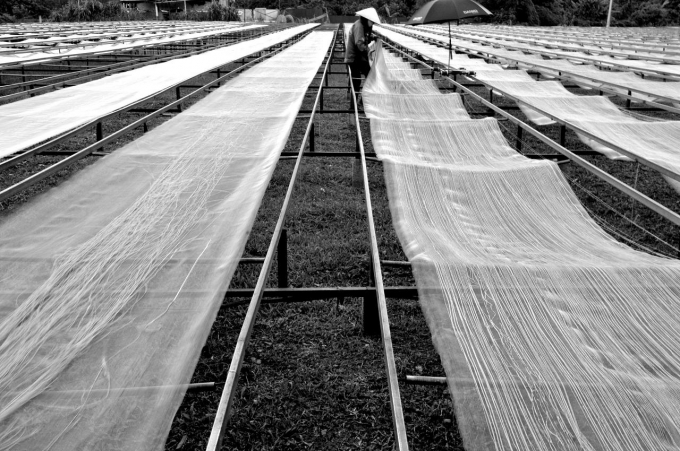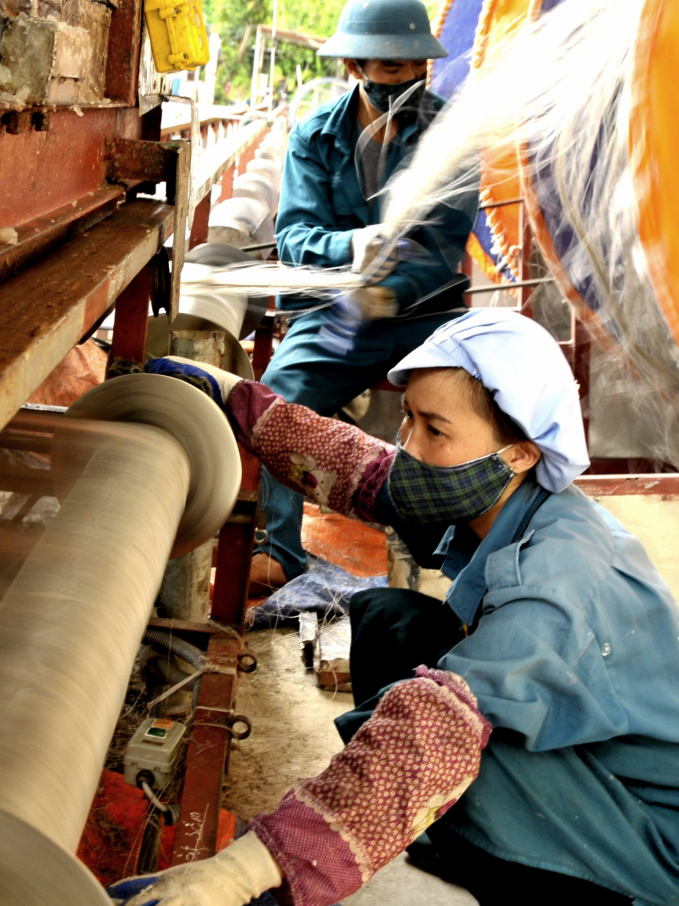November 26, 2025 | 11:02 GMT +7
November 26, 2025 | 11:02 GMT +7
Hotline: 0913.378.918
November 26, 2025 | 11:02 GMT +7
Hotline: 0913.378.918

Drying glass noodles automatically limits the difficulties caused by the weather. Photo: Dong Van Thuong.
The profession of making canna glass noodles (mien dong in Vietnamese) in Viet Cuong hamlet (Hoa Thuong commune, Dong Hy district, Thai Nguyen) has existed for many generations. Viet Cuong glass noodles are initially famous in Thai Nguyen, then later reach out to the whole country and the world.
Viet Cuong glass noodles are deliciously famous for their chewy, fragrant, and luscious noodles. Even if it has already been cooked in the morning and is only warmed up until noon, the noodles won't become mushy. These features are what define the trademark of these glass noodles.
However, in the past, because production conditions depended mostly on the weather, the noodles were only produced seasonally. Every year, the glass noodles makers produce from May until near Tet. Particularly, glass noodles making is concentrated in about 1 to 2 months before the Lunar New Year. Moreover, due to producing glass noodles only by experience but no machines, the production is completely manual, so the productivity is low. Glass noodles have low output and have not been widely advertised in the market, so the glass noodles makers have limited income. Many people had quit their jobs and chose another path. The traditional occupation was at risk of fading.

Automatic glass noodles drying lessens the effects of the weather. Photo: Dong Van Thuong.
In 2005, the determination to restore the traditional craft village drove a 22-year-old young man into action. His name is Nguyen Van Ba (born 1983 - Director of Viet Cuong Glass Noodles Cooperative).
After 2 years of operation, in 2007, Viet Cuong Glass Noodles Cooperative was established. Up until now, after 12 years of operation, the cooperative has built their brand in the market. The total cooperative personnel includes 25 members and 20 regular employees.
The cooperative has applied modern production technology researched and manufactured by the cooperative’s own members, which is an automatic glass noodles drying system, hydraulic glass noodles press, and glass noodles cutting machine. The total drying yard area is 10,000m2, 700m2 in the factory. The cooperative has connected with 150 households to buy canna powder associated with the value chain, 100% of the members' products are purchased by the cooperative with stable prices and good quality. Applying new production techniques has remarkably increased labor productivity and gradually met the growing demand of the consumption market.
Director Nguyen Van Ba continued to invest in a new glass noodles production line with equipment imported from abroad, he himself researched and manufactured the frame parts and several extra parts. He said, when applying modern machinery, his cooperative can produce 2 tons of glass noodles a day, which can be dried and packaged immediately, so there is no need to worry about being affected by the weather.
With great effort, in 2012, he received the honor to be awarded the Luong Dinh Cua Award by the Central Committee of the Ho Chi Minh Communist Youth Union - The award for outstanding young farmers. The glass noodles drying line of Viet Cuong Glass Noodles Cooperative has been patented by the National Office of Intellectual Property. Viet Cuong glass noodles have won many awards, especially being held in great respect as a typical rural industrial product.

Preparation for the glass noodles package at Viet Cuong Glass Noodles Cooperative. Photo: Dong Van Thuong.
Glass noodles produced by Mr. Ba's cooperative have made their appearance in all major supermarkets such as: Co.op Mart Ho Chi Minh City, Intemax Hanoi, Dabaco Bac Ninh, Bac Giang, Thai Nguyen, Hai Phong, Nghe An and is present in almost all provinces of the country. In particular, large orders have been made to export glass noodles to foreign countries such as Taiwan, Thailand, Laos, some countries in the EU...
According to Director Nguyen Van Ba, there have been many more order proposals with foreign partners, but the cooperative is hesitant to sign. In order to meet market demand, the cooperative is expanding their production scale and completing ISO certification. Only when the quality and output sustainability have been guaranteed will the cooperative sign a supply contract.

Packing glass noodles at Viet Cuong Glass Noodles Cooperative. Photo: Dong Van Thuong.

(VAN) An Giang promotes supply-demand connections, standardizes quality and builds value chains, creating a foundation for sustainable bird’s nest development and aiming to expand exports.
/2025/11/24/5339-4-nongnghiep-075331.jpg)
(VAN) Recently, the conference on 'Sustainable Fisheries Linkage Chain - Tilapia for Export' took place in Tien Hai commune, Hung Yen province.
/2025/11/21/4309-2-153400_128.jpg)
(VAN) Green and low-emission rice is paving the way for Vietnamese rice to enter high-end markets, marking the beginning of a transformation journey toward greening and elevating the national rice brand.

(VAN) ‘Right to Win’ outlines a national action plan that shapes a new vision for Viet Nam’s agriculture in an era of renewal and global integration.

(VAN) Lam Dong’s farmed sturgeon output this year is expected to reach 2,300 tons, worth VND 450 billion, affirming the brand’s position on the market.

(VAN) A surge in Ukrainian egg exports, largely driven by soaring sales to the UK over the last few years, has notably pushed up egg prices on the domestic market.

(VAN) The price of Arabica Catimor coffee in Quang Tri is currently at VND 25,000–27,000/kg (fresh cherries), the highest level ever recorded